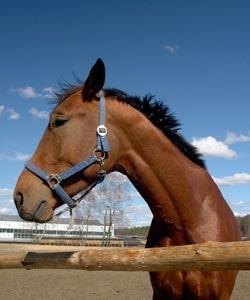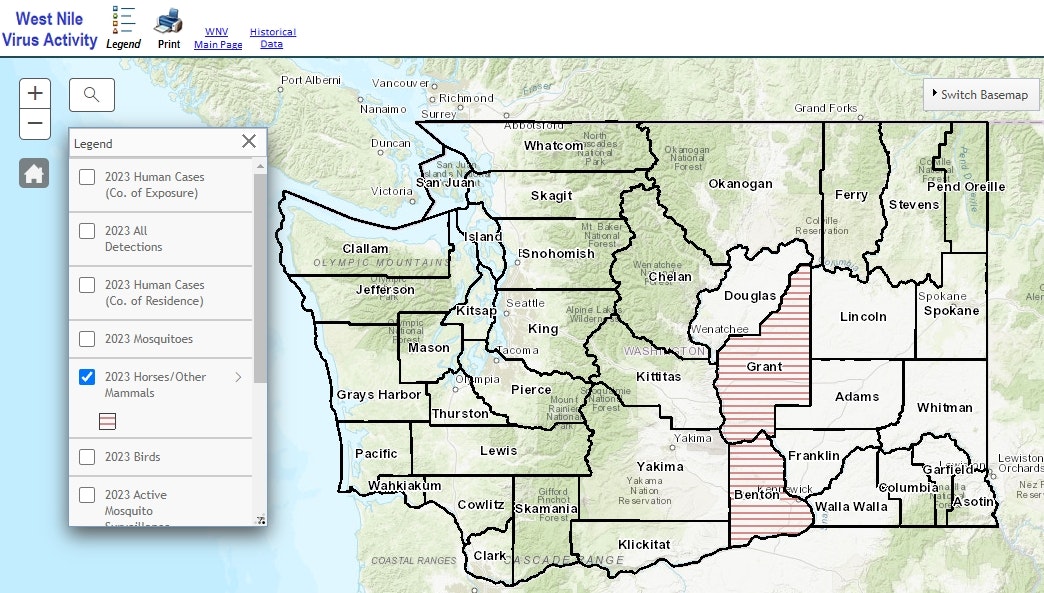West Nile Virus And Horses

West Nile virus (WNv) is a mosquito-borne virus that was first detected in the United States in 1999 and reached Washington State in 2002. However, there was not another confirmed WNv case until 2005. From 2002 through 2017 there have been 212 known/confirmed infections of WNv in horses or other mammals.
The USDA (United States Department of Agriculture) APHIS division (Animal and Plant Health Inspection Service) has some distribution maps for West Nile Virs and Equine Cases, from 2019 going back to 1999. It does not appear that they will continue to update these maps, but if you are looking for historical data across the nation, you can go here USDA - APHIS and then scroll down and click on Distribution Maps.
For most recent data, for Washington only, you can go to DOH - WNV webpage, then look for the most recent West Nile Virus Activity Map. Within this map you can change the filters to only look for horse cases.

Mosquitoes become infected by feeding on infected birds and pass the virus to other birds, animals and people. Both horses and people are considered 'dead-end' hosts; meaning that while infected, they do not spread the infections. Infected horses are not a risk to other horses. However, West Nile virus should be considered a serious threat. The virus normally causes mild symptoms, but it can cause encephalitis; an inflammation of the brain and central nervous system.
Signs may include:
- Weakness of limbs, difficulty in walking, stumbling, knuckling over, falling, the inability to stand, or convulsions.
- Muscle twitching, typically on the face, neck and forelimbs.
- Head tilt or drooling
- Hypersensitivity
Death occurs in about 30% of clinically affected equine. Most surviving animals recover completely, but some may show lasting neurological effects. Horses showing any suspicious signs should be evaluated by a veterinarian for an accurate diagnosis.
Equine Vaccination:
There are licensed vaccines to protect horses, mules, donkeys and other equine against West Nile virus. Vaccinations are the primary protection for this serious disease. The vaccinations require two doses, four to seven weeks apart. Depending on the vaccine used, immunity may not be achieved for at least eight weeks after the second dose. The vaccination process should begin in the spring during the early part of the mosquito season. Work with your veterinarian to develop the best plan for your horse or other equine.
Reporting Suspected Cases in Horses:
Horse owners are encouraged to contact their veterinarian if their animals display signs of illness including loss of appetite, fever, tremors, weakness, or inability to stand. Veterinarians are required to report all cases of equine encephalitis. Any suspected cases of West Nile virus in horses or other equines must be reported to WSDA; Washington State Department of Agriculture.
- Washington State Department of Agriculture; Animal Health Program; (360) 902-1878 or ahealth@agr.wa.gov
- Region 4 (Benton County), WSDA Veterinarian: Dr. Ben Smith, (509) 350-0081, bsmith@agr.wa.gov
- Region 3 (Yakima County), WSDA Veterinarian: Dr. Dana Dobbs, (509) 607-4974, ddobbs@agr.wa.gov
Additional Information & Contacts:
- Benton-Franklin Health District; Environmental Health, 509.582.7761
- Benton County Mosquito Control; Kevin Shoemaker, 509.967.2414
- WSU Extension Office; 509.735.3551
- Washington State Department of Health; 866.788.4787
- U.S. Department of Agriculture; 360.753.9430
Websites related to Equines and WNV:
- Washington Department of Agriculture
- Penn State Extension
- Animal & Plant Health Inspection Service (APHIS)
WSU Extenstion PDF on Protecting Horses from West Nile Virus
WSU extension_WNV_Protect Your Horses_FS201E.pdf
